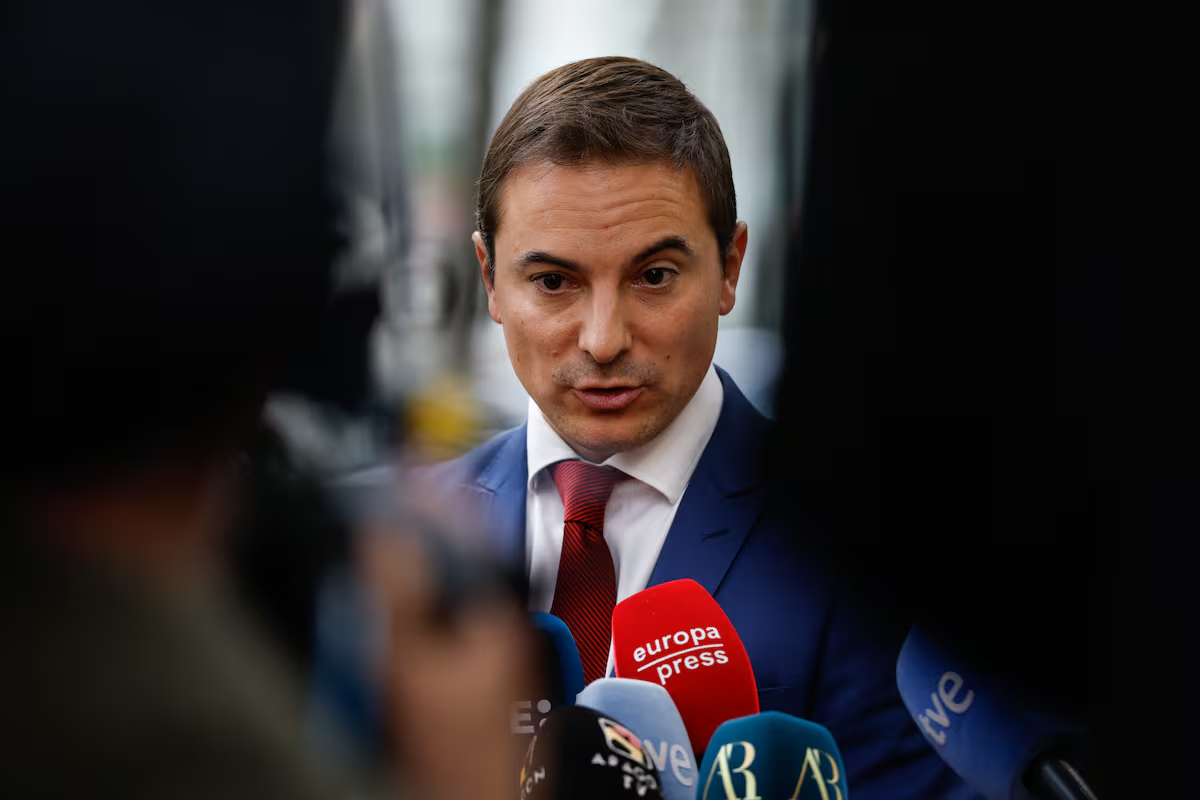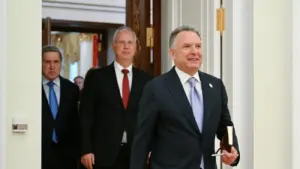
On March 14, 2024, at 8:29 am, Juan Lobato, leader of the PSOE in Madrid, received a WhatsApp message from Pilar Sánchez Acera, a high official of La Moncloa, in which she attached the photo of the email from Alberto González Amador’s lawyer asking for an agreement in which he would confess to his client’s tax crimes. He does this to be able to show the photo in the control room to the president of the Community of Madrid, Isabel Díaz Ayuso. “Say it in the question: ‘Who is lying, Mrs. Ayuso? You or your boyfriend? It seems like you’. The image of the letter is powerful,” Sánchez Acera tells her. “But has this letter been published anywhere?” Lobato responds. Two minutes later, Lobato insists: “How do we get the letter?” Sánchez Acera: “Because it’s coming, the media has it. Let’s see it. To get more support. If so, I’ll tell you.”
The fact is that Pilar Sánchez Acera had the capture of the email before any media published it (it is published The plural, newspaper directed by the socialist historian Angélica Rubio, at 9:06). Sánchez Acera sends the connection to Lobato at 9.29 with the phrase “enough” and what Lobato should say to Ayuso in plenary. Why did he have it and no media published it? Because it was circulating in the editorial offices (the news had already been published), Sánchez Acera came to say, even if no one had bothered to show the document that supported it. She and Lobato say they don’t know where that document originally came from. They deny that it came from the government or the Prosecutor’s Office. It reaches Sánchez Acera, he says, because it is already circulating in the editorial offices. A journalist passes it to him, but he doesn’t remember the name. As you may remember the name of someone who leaked a document that mobilized the Supreme Court and could bring down the State Attorney General. It is typical for “journalists” to send La Moncloa a document that benefits them before publishing it. Sánchez Acera, among other things, was cabinet director of the cabinet director of the President of the Government, Pedro Sánchez. However, they call her to testify for something else.
But back to Lobato, no one knows what he’s doing in the process. It’s like inserting a friendly match between official competitions. Nothing Lobato can say or do will have judicial relevance. Probably until he asked to testify in the morning. After his conversation on WhatsApp with Pilar Sánchez Acera, his former collaborator, he went to the notary with the acquisitions. The traditional trust that inspires the PSOE. I hope the method will be transferred to couples. “Shall we go to the cinema today?” “Perfect”. And show up at the notary’s office to make sure. Miguel Ángel Rodríguez had already warned the day before that being a notary is a nuisance. Lobato turned to the notary because he feared that the PSOE was setting a trap for him: if he showed an illegally leaked document, he would go to the notary. dear with the whole team. He went to dear Same thing: he resigned a few days later, precisely for having gone to the notary. We have to go to the notary as often as necessary, but we don’t learn.
Alberto González Amador’s lawyer, the prosecution lawyer, Gabriel Ramos, is particularly harsh. Lobato handed over his cell phone to the UCO and the parties had their chats in front of them. Those that concern the case, it is presumed, even if it is true that Lobato is a little red. One thing that is often done in trials is to question witnesses about the issues the lawyers have before them. For example, they have copies of Lobato’s chats in their possession. They start soft (“Are you Juan Lobato?” Lobato hesitates) and then rise until they reach the God level. “Did you correspond with this person on Thursday, October 14 at 5:52 pm? What emoji did you end the conversation with? The dolphin, perhaps?” “If you’re reading this on my phone, man.” More than interrogations, they are memory exercises. As soon as it’s finished, we start with the hearing: we take out a screen with the o and cover one eye of the witness. “Do you see what letter that is?” “The a.” “Look carefully, man.”
Lobato goes through the phases with ease, but when they ask him to remember very specific things he plays the wild card. “I don’t remember, but if you have it in front of you, that’s it. That’s why I gave you my phone number.” “I don’t remember exactly, but I handed over my cell phone, so if you read it from there, that’s it.” And it continues. The questions require such meticulous memory that Lobato doesn’t even listen to them anymore and responds on autopilot: “I don’t remember, but he’s reading it from my phone, so I must have said it.” After 87 questions about whether or not he remembered the things the lawyer read on Lobato’s cell phone, Lobato is ready for something else. “Did you celebrate the attacks on the Twin Towers?” “Let’s see, it doesn’t seem like anything to me, but if you’re reading this on your phone it must have been like this, I’m sorry.” “Did you want Greta Thunberg and her little sister Beata to die in a crematorium?” “Well, maybe it was very cold that day and I went out without a cardigan, the truth is I don’t remember.” Lawyer Ramos could have asked anything, the trust Lobato had in his cell phone was extreme.
There was anticipation for the statement from José Precedo, journalist from The diary who signed the exclusive on the investigation into the tax fraud of Alberto González Amador. Miguel Ángel Rodríguez wants it, so González Amador’s lawyer, Gabriel Ramos, applies himself in a big way. Precedo shows up with a jacket with elbow pads that almost passes from witness to investigator. Lawyer Ramos questions and questions Precedo about the news publication processes. He wants you to get hooked, but also shows genuine interest. Form investigative teams, talk to sources, compare what these sources say with other sources, respect the conditions of the sources, prove the information with documents so as not to get caught. All this really interests González Amador’s lawyer. He scratches his head, nodding silently. MÁR had never spoken to him about these things. MÁR had told him that being a journalist means opening Twitter, letting a monkey sit on the keyboard for five seconds and then clicking Publish. Precedo tries to be didactic. Lawyer Ramos listens to him attentively as he seems to think: “But this man is not a journalist, this man is a notary!”
When the questions end and the president of the room invites him to leave, Precedo asks to speak. “May I make one final statement?” Alberto González Amador had made it the day before, but the reason is that González Amador is part of the prosecution and Precedo is only a witness. “No, he can’t if they don’t ask him more questions,” says the president. I didn’t intend to go beyond González Amador’s last statement (“either I leave Spain or I commit suicide”), so the president of the chamber did well. In fact these latter claims should be banned forever. There is nothing left to see there.





